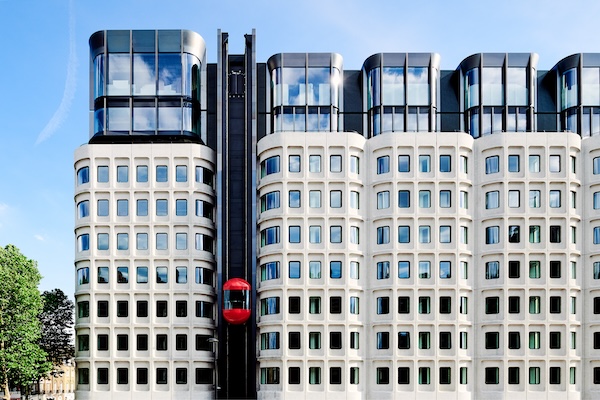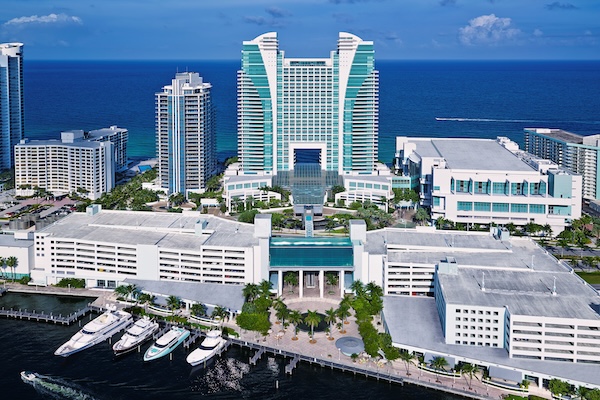Sean Hehir, the CEO of Trinity Investments, has a Dickensian notion of the hotel industry: a tale of two segments, where strong performance in one is offset by tepid performance in the other. The data support him: STR forecasts RevPAR growth in the higher-end chain scales to best the lower-end chain scales. More specific, STR expects RevPAR in the luxury segment to increase 2.9% in 2025, 2.2% in 2026 and 2.5% in 2027. The predictions are even higher in the upper-upscale segment. Conversely, midscale segment RevPAR is forecast to contract, down 0.7% in 2025. Meanwhile, economy RevPAR is predicted to be flattish through 2027.
Good for Hehir: His private real estate investment firm solely invests in upper-upscale and luxury hotels, typically in resort or urban markets. Two of its latest acquisitions are perfect examples. In November 2024, Trinity, along with partners, acquired the 266-room Standard, London, followed up by the December buy of the 450-room Fairmont Olympic Hotel, Seattle. Talk about back-to-back home runs.
The two deals came on the heels of one of the larger hotel acquisitions of 2023, when Trinity and partner Credit Suisse Asset Management bought the 1,000-room Diplomat Beach Resort in Hollywood, Fla., which is currently operating within Hilton’s Curio Collection until it officially reflags under the Hilton Signia brand after a renovation and repositioning.
It might be short of the Holy Trinity, since smart investment, not providence, got Trinity to the finish line on the deals. It’s all a function of Trinity’s investment ethos. “We focus on under-renovated, under-asset-managed and under-appreciated assets,” Hehir said. “We are true value-add investors and, as such, need to be able to find opportunities at any point in a cycle.”
Right now could be a good time. Though 2024 was a rather weak year for transactions, hotel deals globally are forecasted to be up some 25% in 2025, according to JLL. Part of the acceleration could be due to loan maturities and brands mandating long-put-off, property-improvement plans. “We’re starting to see some owners under pressure with lenders, trying to get extensions, and the hotel brands that are going to start enforcing their PIPs,” Hehir said.
In the case of the Diplomat, Trinity and Credit Suisse acquired the hotel from Brookfield for a reported $835 million and after it had undergone a $90-million renovation in 2018. It later secured a $575-million-floating-rate loan to help pay down existing debt and toward the reposition.
The hotel is connected to its own 200,000-square-foot convention center, which bodes well as conference demand and group business continue their march back. Hehir might have a Dickensian view of hotel industry performance, but his investment conviction is decidedly Twainish: Buy land, they’re not making it anymore. “Where can you find 10 acres of land on the Atlantic in South Florida with a 1,000-room hotel?” Hehir mused. “It is the epitome of irreplaceable real estate. That stuff is not getting built anymore.”
On the other hand, Trinity’s purchase of Fairmont Seattle got a boost from Jeff Bezos when Amazon directed its Seattle employees to be in the office five days a week starting January 1, 2025. “It was a real ‘aha!’ moment for us,” Hehir said.
Equally fortuitous, expect The Standard, London to have even higher returns after Hyatt Hotels Corp. acquired Standard International around the same time Trinity bought the hotel. “It suddenly changed the profile of corporate travelers wanting to book there because they could earn points,” Hehir said.

Investment Ethos
Trinity does not put money into new development; it exclusively buys and sells assets. In that way, it’s not only interested in the purchase, but the disposal. All the work that Trinity puts into an asset it expects to recoup at exit; thinking about others is not the typical investor persona. “Who is this going to appeal to down the line?” Hehir said. Not many real estate companies have the fortitude and constitution to do large repositioning projects like Trinity, but when completed, and the time to sell comes, the payoff can be enormous. “There’s a plethora of buyers out there that want well-located, stabilized assets that are irreplaceable and in high-barrier markets,” Hehir said.
In 2022, via joint venture, Trinity acquired Four Seasons Dallas at Los Colinas, which it subsequently repositioned into The Ritz-Carlton Dallas, Las Colinas. Almost three years later, it still owns the property, but Hehir can see the horizon. “Maybe it goes to a REIT that has a need for Dallas exposure,” he pondered. Or, consider the 2021 purchase of East Miami, again through JV. “That could be an ultra-high-net-worth family office that buys it,” he said. “We spend a lot of time thinking through [these scenarios].”
Hehir doesn’t reveal his hand, but if Trinity’s asset strategy is any indication, East Miami may be up for sale soon. He is very clear about Trinity’s steps for buying and selling hotels; it’s a roadmap: 1) The first year is spent planning what to do now that it owns the hotel, what types of renovations are needed and how to reposition the hotel successfully. 2) In the second year, it’s about implementing the plan built out in year one. 3) The third year revolves around stabilizing the asset. 4) In the fourth year, “that’s when we start to look to potentially exit,” Hehir said, adding, “You don’t want to run into things without having the proper work done up front.”

Evading Potholes
It’s a four-year plan, not five, and though hotel transactions have been stunted coming out of the pandemic, a fast-paced, frenetic market for hotel deals could be just up around the bend, especially since hotels as an asset class have shown resilience in tough economic times and boom times in favorable ones. A heavy expediter of hotel trades is interest rates, which remain willfully high in the face of stubborn inflation. Still, as Hehir suggested, Trinity’s portfolio remains in an advantageous position. “We typically trade around a 7% cap rate, so can absorb 8% interest rates,” Hehir said, noting the narrower spread. Other asset classes and even other types of hotels don’t have that luxury. “It’s more challenging when you’re trading at 4% cap rates and you’re reliant on fixed-rate loans at 100 basis points tighter than that,” he said.
Though some hospitality executives have bemoaned the lack of available debt, Hehir said Trinity has not faced such obstacle, having executed close to $3.5 billion dollars’ worth of either financing or refis over the last 18 months. And with new supply tracking at historical lows, Trinity, with a portfolio of hotels in high-barrier-to-entry markets, remains in an advantageous position. Hehir doesn’t appear worried over the spigot being turned on fast for new construction, especially in the upper-upscale to luxury realm. “It’s very hard to get the approvals and the entitlements,” he said. “You don’t really see it happening unless there is, for example, local government subsidies and tax abatements.”
The last component of it is the availability of construction financing, which Hehir noted “a lag,” pointing to the regional banking crisis of 2023, “that has created a little bit of illiquidity in the debt markets.”
Hehir’s road to success in hospitality has been less bumpy and it was helped paved by a push from his father. When Hehir, who grew up in Botswana, reached 18-years-old, like many aimless teenagers he wasn’t sure what to do next. His father recommended hotel school. “He looked at me, and said, ‘Sean, you like people, you like travel and you like business.’ That was the catalyst.”
He kicked off his hospitality matriculation in Switzerland and did his first internship at the famed Baur au Lac in Zurich, where starting at the bottom as a busboy instilled in him his love for the business. He eventually came to the U.S., first taking courses at UNLV before graduating from Cornell and its well-regarded hospitality school. “I couldn’t imagine doing anything else,” he said.
Hehir has steered more than $8 billion in investment during his 25-plus-year tenure with Trinity. Unlike some real estate groups that spread capital across various asset groups, Trinity solely invests in hospitality and with a current portfolio of 15 full-service hotels and resorts, it will keep it that way. For full-year 2024, Trinity invested more than $730 million globally in hotels and hospitality assets across the globe. Unlike other asset classes, which typically come with fixed leases, such as office or multi-family, hotels are an operating business cloaked in real estate, where lease terms change daily. “It’s a nuanced asset class,” as Hehir put it, which makes asset management and project management intrinsic to overall success rates.
For Trinity, success might not come in threes, but like a three-peat, it’s repetitious.
